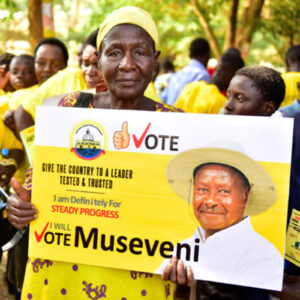
Kampala, Uganda
The National Resistance Movement (NRM) National Delegates Conference has endorsed President Yoweri Museveni as the party’s presidential flagbearer for the 2026–2031 term.
In his acceptance speech, during the opening of the National Delegates Conference at Kololo Independence Grounds, President Museveni thanked delegates for entrusting him once again with the chairmanship of the party and the mandate to represent NRM in the upcoming presidential contest.
“I thank you for putting trust in me to be your chairman of the NRM for the period 2026–2031, and for electing me as the party flagbearer for the presidential contest. I congratulate Hon. Hajji Moses Kigongo, a senior cadre of the NRM since 1980, for being elected unopposed,” Museveni said.
Uganda’s Economic Journey
Museveni traced Uganda’s economic history from the colonial period, when the economy was largely based on “the three Cs and three Ts”—cotton, coffee, copper, tobacco, tea, and tourism. By 1961, only 9% of households were engaged in income-generating activities, while the majority survived on subsistence farming.
He recalled that the economic collapse under Idi Amin’s regime led to shortages of basic commodities, but that the NRM government had since guided the country through five phases of economic recovery and growth:
Minimum Economic Recovery—restoring key cash crops like cotton, coffee, tea, and tourism while defeating the black market.
Expansion of the small enclave economy—increasing production of traditional cash crops.
Diversification—making crops such as maize, bananas, milk, beef, cassava, and fruits recognized as cash products.
Value Addition—promoting local industries in textiles, leather, furniture, and other sectors to maximize returns and create jobs.
Knowledge Economy—investing in innovations such as electric vehicles and technology-driven industries.
Museveni noted that Uganda’s economy has since grown from $3.9 billion in 1986 to $66 billion today, with a purchasing power parity (PPP) value of $188 billion. He emphasized that the next phase is a “qualitative leap forward” to transform the economy into a $500 billion high middle-income economy by adding value to raw materials and promoting modern industrialization.
Call for Modernization and Peace
Museveni underscored the importance of transitioning Uganda into a modern society where citizens rely on technology and innovation rather than manual labor.
He highlighted seven guiding principles, beginning with peace, which he said must be preserved at all costs. “NRM has been able to keep peace here for the last 40 years. This may be the first time in 600 years that this area has had peace continuously,” he noted.
He also stressed the distinction between development (ours), which involves public infrastructure such as roads, schools, and hospitals, and wealth (mine), which is created at the household level through commercial agriculture, manufacturing, services, and ICT.
Inspiration for Young People
The President encouraged youth leaders to embrace wealth creation, citing examples of young entrepreneurs who have successfully applied his four-acre model of farming to generate income through dairy, poultry, cassava, and value addition projects.
Museveni urged Ugandans to focus on building household wealth, promoting peace, and supporting the NRM’s vision of transforming Uganda into a modern, high-income society.
Anita Among wins
In CEC elections, Speaker Anita Among was picked ahead of Rebeccas Kadaga, as Mike Mukulu withdrew for Echodu in the eastern race.
President Museveni said: ” I have received the withdrawal of Capt. Mike Mukula from the race of Vice Chairman Eastern Region in favor of Mr David Calvin Echodu. I consistently advocate for solution-based leadership; it’s not about who leads but what is accomplished. I commend the two leaders for going back to our principle of shared interest as opposed to individual position.”

Mukula and Echodu meet President Museveni


















